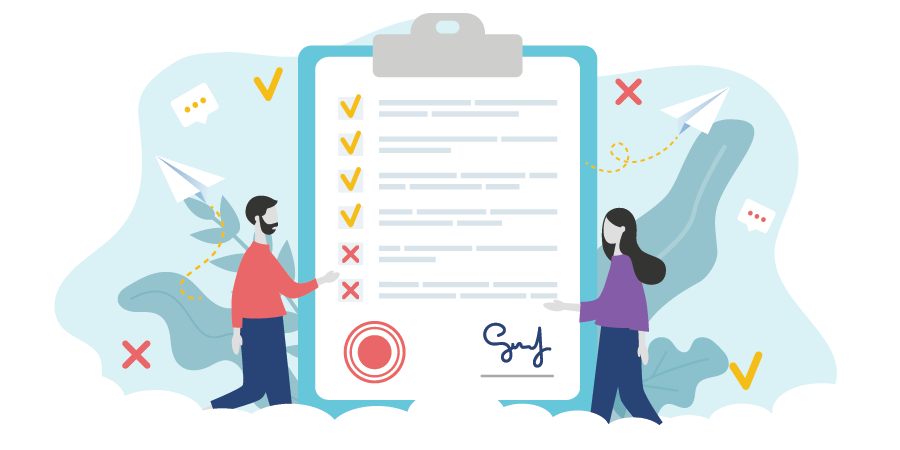3 Things Every Engineering Proposal Should Include
June 16, 2022

Proposals are a critical part of doing business for all Engineers—and not just because they help you secure new work. It’s because they set the boundaries of your project. They help you to define, communicate, and control client expectations. If successful, they form the basis of your contract. And in the event of a claim, they are one of the first places the courts will look to determine your liability. That also makes them one of your best defences against a lawsuit.

You might not always have all of the details before you’re involved in a project, but it’s critical to flesh out the terms of your proposal so your client knows exactly what you’re doing and why—and so you can minimize your exposures and avoid any potential loss. While there are several basic elements every proposal should include, we’ve highlighted three that could make or break your case during a claim. Keep reading to learn more.
Disclaimer: Please note the information provided herein offers guidelines only and is presented from a liability-based perspective to help you avoid insurance claims. It is not exhaustive and should not take the place of legal advice, nor will it apply to all businesses, settings, and circumstances. For specialized guidance, please consult a lawyer or a licensed insurance representative.
1. Scope
THE RISK:
An unclear and confusing scope is a project killer. Without a proper overview, your team—and your client—won’t know what work is and isn’t part of the job. However, writing a scope might be challenging if you don’t have all of the information to start with. Or if the design is conceptual in nature and you have to make assumptions to model accurately.
Say you submit preliminary drawings for a building based on the bearing capacity of a particular soil. The client interprets the plans as final and the project moves to construction. If the structure starts to lean or sink, they could sue you for the cost of labour, building materials, and more. And as far as the courts are concerned, you’re liable as long as you stamped the drawings. Even if the design was conceptual, you still technically gave the go ahead to build.
PRO Tips:
Define the project scope as accurately and explicitly as possible. Be sure to specify what you will do and what you WON’T do, including the basic services you’ll provide and any additional services that may arise during the construction process. State any assumptions you’ve made and put disclaimers in your design documents where needed. Include a section on constraints and/or contingency items to address the design standards you’ll use, why, and any conditional factors; this is especially important for preliminary drawings.
Be as precise as you can; the more detailed you are, the higher your chances of meeting the client’s expectations and avoiding a claim. Plus, a clear scope will help to eliminate any grey areas and prevent scope creep and any unauthorized tasks from cropping up throughout the project.
RELATED: 3 Common Engineering Mistakes—and How You Can Avoid Them
2. Field Reviews
THE RISK:
Design Professionals are obligated to verify compliance with plans, building codes, and applicable bylaws, particularly in areas where the repercussions of an error could be severe. But between the hours billed for inspection, travelling to and from the worksite, and documentation, field review costs can add up quickly for the client.
Here’s where you can get into trouble: to stay within budget, your client might pressure you to cut down on field services or to remove them altogether. But if you’re not there to check the work, there’s greater potential for someone to make an error or cover up any design flaws before you have a chance to fix them. If the damages are too costly to repair, you could be hit with a lawsuit.
It gets worse. Even if there’s no mention of field services in your proposal, most contracts generally contain an implied duty of good faith and fair dealing. For Engineers, that includes an implied duty of inspection, which means the courts could still find you negligent for not reviewing your work.
PRO Tips:
Hold regular constructability review meetings with all major stakeholders (designers, contractors, consultants, the client, etc.) to go over the project. This way, you can identify and address any potential defects, provide feedback on changes that may affect your work, and prevent delays and cost overruns. Plus, you can plan ahead and determine what stage individual team members should collaborate with one another (i.e. contractors can alert you before important areas are to be hidden from view so there is sufficient time for field reviews).
The frequency of the meetings will depend on the scope of the job. Be sure to take minutes for all meetings and share them with everyone involved. Note the time, date, and main discussion points, such as next steps and assigned responsibilities.
RELATED: Here’s Why an Engineer Might Get Sued and What You Can Do About It
3. The Right to Stop Services (If You Haven’t Been Paid)
THE RISK:
Your proposal should clearly outline the terms of payment, like your charge-out rate and how many hours you’ve already worked and/or anticipate working. But what if your client stops paying you? Maybe the project is over budget or the cash flow is tied up and your client can’t afford to pay you just yet. Or maybe you’re a sub-consultant to a contractor or an architect and they can’t pay you because the client hasn’t even paid them. Either way, you’re not making any money. What happens if you decide to stop working?
Unless it’s stated otherwise in your proposal, you’re still obligated to proceed with due diligence to meet the agreed progress of the project. Otherwise you’re in breach of your contract. Failure to fulfill these obligations means you can be held liable for any damages or production delays caused by your refusal to work. In short, your client could terminate your contract and sue you for any subsequent losses, like the cost of hiring a new consultant to review and take over your work.
PRO Tips:
To keep nonpayment from becoming a liability issue, set out your payment schedule in your proposal and include a clause that gives you the contractual right to stop working if you haven’t been paid within a specific period of time. The timing of the schedule is up to you, but whoever is responsible for paying you directly, whether it’s the developer, a contractor, or a subcontractor, should be aware of your payment terms.
RELATED: Engineers: Can your specialty affect your insurance rates?
Need guidance?
Writing proposals is an art. A strong proposal won’t just minimize the likelihood of a claim; it’ll also help you keep your team in sync, improve project efficiency, and complete projects on schedule.
For more guidance on proposals, contracts, and how you can control your liability, consult with a risk advisor that specializes in the engineering sector. With over 40 years of experience, a licensed broker like PROLINK can help you navigate industry trends and adopt a proactive approach to risk management to control your costs long-term. Our dedicated team of risk advisors will help you:
- Identify exposures based on your business operations and engineering discipline;
- Share what steps others in your industry are taking and advise you accordingly;
- Conduct a robust assessment of your existing insurance policies to detect any coverage gaps;
- Secure a comprehensive solution that aligns with your unique needs and strategic objectives.
Connect with PROLINK today for more!
PROLINK’s blog posts are general in nature. They do not take into account your personal objectives or financial situation and are not a substitute for professional advice. The specific terms of your policy will always apply. We bear no responsibility for the accuracy, legality, or timeliness of any external content.




